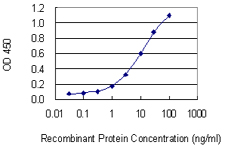CNR2 Antibody (monoclonal) (M01)
Mouse monoclonal antibody raised against a partial recombinant CNR2.
- SPECIFICATION
- CITATIONS
- PROTOCOLS
- BACKGROUND

Application
| WB, IF, E |
|---|---|
| Primary Accession | P34972 |
| Other Accession | NM_001841.1 |
| Reactivity | Human |
| Host | mouse |
| Clonality | Monoclonal |
| Isotype | IgG1 Kappa |
| Clone Names | 3C7 |
| Calculated MW | 39681 Da |
| Gene ID | 1269 |
|---|---|
| Other Names | Cannabinoid receptor 2, CB-2, CB2, hCB2, CX5, CNR2, CB2A, CB2B |
| Target/Specificity | CNR2 (NP_001832.1, 302 a.a. ~ 360 a.a) partial recombinant protein with GST tag. MW of the GST tag alone is 26 KDa. |
| Dilution | WB~~1:500~1000 |
| Format | Clear, colorless solution in phosphate buffered saline, pH 7.2 . |
| Storage | Store at -20°C or lower. Aliquot to avoid repeated freezing and thawing. |
| Precautions | CNR2 Antibody (monoclonal) (M01) is for research use only and not for use in diagnostic or therapeutic procedures. |

Thousands of laboratories across the world have published research that depended on the performance of antibodies from Abcepta to advance their research. Check out links to articles that cite our products in major peer-reviewed journals, organized by research category.
info@abcepta.com, and receive a free "I Love Antibodies" mug.
Provided below are standard protocols that you may find useful for product applications.
Background
The cannabinoid delta-9-tetrahydrocannabinol is the principal psychoactive ingredient of marijuana. The proteins encoded by this gene and the cannabinoid receptor 1 (brain) (CNR1) gene have the characteristics of a guanine nucleotide-binding protein (G-protein)-coupled receptor for cannabinoids. They inhibit adenylate cyclase activity in a dose-dependent, stereoselective, and pertussis toxin-sensitive manner. These proteins have been found to be involved in the cannabinoid-induced CNS effects (including alterations in mood and cognition) experienced by users of marijuana. The cannabinoid receptors are members of family 1 of the G-protein-coupled receptors.
References
1.Endocannabinoid crosstalk between placenta and maternal fat in a baboon model (Papio spp.) of obesity.Brocato B, Zoerner AA, Janjetovic Z, Skobowiat C, Gupta S, Moore Ii BM, Slominski A, Zhang J, Schenone M, Phinehas R, Ferry RJ Jr, Dick E Jr, Hubbard GB, Mari G, Schlabritz-Loutsevitch NPlacenta. 2013 Sep 2. pii: S0143-4004(13)00692-9. doi: 10.1016/j.placenta.2013.08.007.
If you have used an Abcepta product and would like to share how it has performed, please click on the "Submit Review" button and provide the requested information. Our staff will examine and post your review and contact you if needed.
If you have any additional inquiries please email technical services at tech@abcepta.com.













 Foundational characteristics of cancer include proliferation, angiogenesis, migration, evasion of apoptosis, and cellular immortality. Find key markers for these cellular processes and antibodies to detect them.
Foundational characteristics of cancer include proliferation, angiogenesis, migration, evasion of apoptosis, and cellular immortality. Find key markers for these cellular processes and antibodies to detect them. The SUMOplot™ Analysis Program predicts and scores sumoylation sites in your protein. SUMOylation is a post-translational modification involved in various cellular processes, such as nuclear-cytosolic transport, transcriptional regulation, apoptosis, protein stability, response to stress, and progression through the cell cycle.
The SUMOplot™ Analysis Program predicts and scores sumoylation sites in your protein. SUMOylation is a post-translational modification involved in various cellular processes, such as nuclear-cytosolic transport, transcriptional regulation, apoptosis, protein stability, response to stress, and progression through the cell cycle. The Autophagy Receptor Motif Plotter predicts and scores autophagy receptor binding sites in your protein. Identifying proteins connected to this pathway is critical to understanding the role of autophagy in physiological as well as pathological processes such as development, differentiation, neurodegenerative diseases, stress, infection, and cancer.
The Autophagy Receptor Motif Plotter predicts and scores autophagy receptor binding sites in your protein. Identifying proteins connected to this pathway is critical to understanding the role of autophagy in physiological as well as pathological processes such as development, differentiation, neurodegenerative diseases, stress, infection, and cancer.





